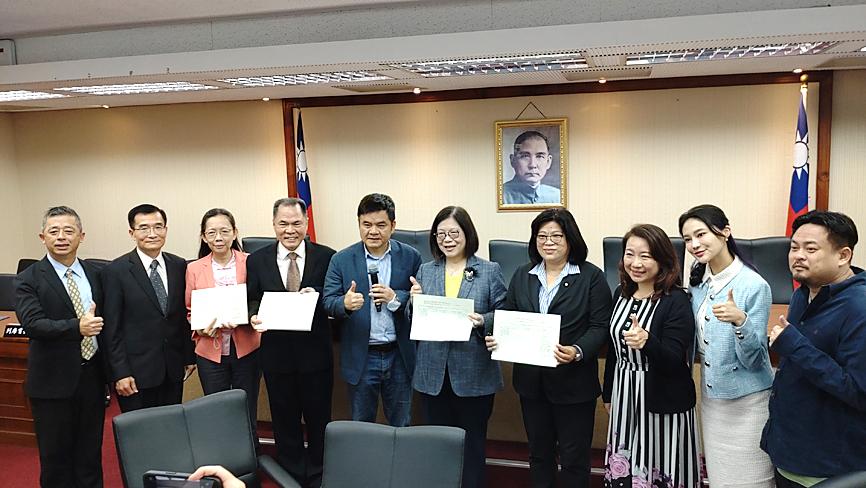Coast Guard Administration’s (CGA) personnel could soon be allowed to use weapons to defend themselves or others without firing warning shots, after the Legislative Yuan Internal Administration Committee yesterday passed the first reading of draft amendments.
The amendments to the Use of Weapons and Requisite Instruments by the Coast Guard Authority Act (海岸巡防機關器械使用條例) are to be considered on the legislature floor without interparty negotiations, the committee told a news conference in Taipei.
The Ocean Affairs Council released the draft amendments last month, citing a need to raise the coast guard’s rules of engagement to the National Police Agency’s standards.

Photo: Yang Cheng-yu, Taipei Times
The draft — which proposes 19 changes to the act’s 17 articles — would significantly change the CGA’s operational guidelines, the council said at the time.
The amendments would authorize coast guard personnel to defend life with any weapon at their disposal, except naval guns, instead of being limited to the current law’s specific classes of weapons and implements.
The council is to determine via an administrative order which weapons and restraints to assign to coast guard personnel, the amendments say, adding that the use of weapons or other implements to capture resisting subjects, or prevent detainee escape, would be allowed when necessary.
Objects that happen to be within reach could be used as a weapon or restraint if issued equipment is unavailable or inappropriate in the circumstance, the amendments say.
Use of naval artillery could be authorized at the discretion of the CGA director-general, or the highest-ranking CGA officer if the former cannot be reached, or in urgent situations.
Such weapons can currently only be used after firearms, blades or other authorized implements have proven ineffective.
If use of force by coast guard personnel results in a death or injury, an investigation is to be conducted by a council-appointed committee of experts, while those injured by use of force could make a claim under the State Compensation Act (國家賠償法), the amendments say.
The amendments would empower coast guard personnel to use weapons and restraints more effectively while establishing an impartial investigative mechanism to protect human rights, the council said.

Taiwan is to commence mass production of the Tien Kung (天弓, “Sky Bow”) III, IV and V missiles by the second quarter of this year if the legislature approves the government’s NT$1.25 trillion (US$39.78 billion) special defense budget, an official said yesterday. Commenting on condition of anonymity, a defense official with knowledge of the matter said that the advanced systems are expected to provide crucial capabilities against ballistic and cruise missiles for the proposed “T-Dome,” an advanced, multi-layered air defense network. The Tien Kung III is an air defense missile with a maximum interception altitude of 35km. The Tien Kung IV and V

The disruption of 941 flights in and out of Taiwan due to China’s large-scale military exercises was no accident, but rather the result of a “quasi-blockade” used to simulate creating the air and sea routes needed for an amphibious landing, a military expert said. The disruptions occurred on Tuesday and lasted about 10 hours as China conducted live-fire drills in the Taiwan Strait. The Civil Aviation Administration (CAA) said the exercises affected 857 international flights and 84 domestic flights, affecting more than 100,000 travelers. Su Tzu-yun (蘇紫雲), a research fellow at the government-sponsored Institute for National Defense and Security Research, said the air

Taiwan lacks effective and cost-efficient armaments to intercept rockets, making the planned “T-Dome” interception system necessary, two experts said on Tuesday. The concerns were raised after China’s military fired two waves of rockets during live-fire drills around Taiwan on Tuesday, part of two-day exercises code-named “Justice Mission 2025.” The first wave involved 17 rockets launched at 9am from Pingtan in China’s Fujian Province, according to Lieutenant General Hsieh Jih-sheng (謝日升) of the Office of the Deputy Chief of the General Staff for Intelligence at the Ministry of National Defense. Those rockets landed 70 nautical miles (129.6km) northeast of Keelung without flying over Taiwan,

A strong continental cold air mass is to bring pollutants to Taiwan from tomorrow, the Ministry of Environment said today, as it issued an “orange” air quality alert for most of the country. All of Taiwan except for Hualien and Taitung counties is to be under an “orange” air quality alert tomorrow, indicating air quality that is unhealthy for sensitive groups. In China, areas from Shandong to Shanghai have been enveloped in haze since Saturday, the ministry said in a news release. Yesterday, hourly concentrations of PM2.5 in these areas ranged from 65 to 160 micrograms per cubic meter (mg/m³), and pollutants were